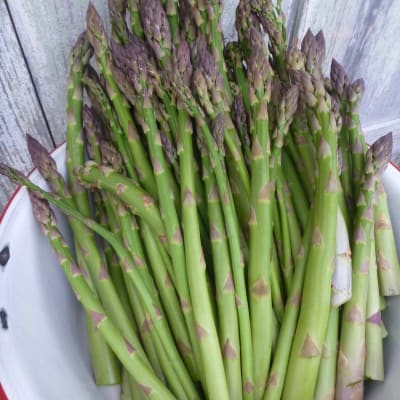(2.3-6.6-7) Formerly known as Gungnir Mix. Formulated to meet Penn State Extension’s recommendations for the annual fertilization of asparagus beds: contains bone char, alfalfa meal, sulfate of potash, wollastonite, non-GMO soybean meal, and compost.
Mighty Spears will help you strike your target yields regardless of your strength and skill as a gardener, but do start by ensuring that your soil pH is adequate (asparagus hates acidic soil) and keep your beds well-weeded and well-watered. Broadcast before spear emergence or after harvest at 2.5# per 10 row feet or 2000# per acre. To keep this product shelf-stable, we pack the compost in a small plastic bag within the main bag; mix it with everything else at fertilization time. MOFGA





